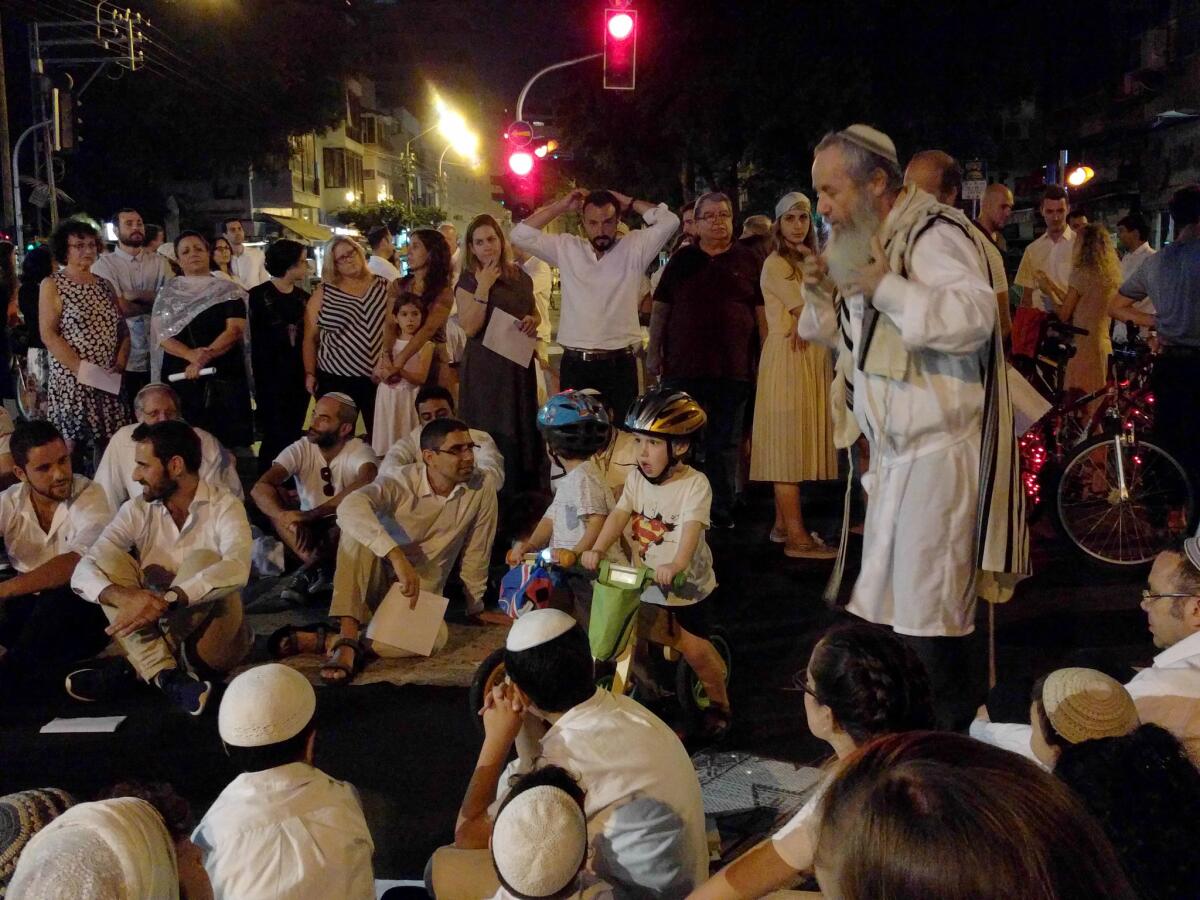On the holiest day in the Jewish calendar, bicycles take over Tel Aviv

Reporting from tel aviv — As afternoon dims into dusk on the eve of Yom Kippur, an extraordinary thing happens in this secular metropolis: Israel’s city that rarely sleeps grinds to a standstill and is enveloped in a strange and wonderful silence.
Traffic thins and eventually disappears, clearing the junctions that are usually groaning and clogged. Stores are shuttered as last-minute shoppers queue up to buy provisions to last the 25-hour holiday, the holiest day on the Jewish calendar.
While religious Jews dressed in holiday whites hurry to synagogue to start atoning for the past year’s sins, a secular ritual is also beginning.
Parents lug bicycles out of basement bomb shelters. Children pop their heads out in between parked cars to see if it is finally safe to go into the road. The echo of car horns is replaced by the pinging of bicycle bells.
Such is the odd spiritual yin and yang of Jewish observance in Tel Aviv.
Israel has no law banning driving on Yom Kippur, but the only vehicles on the roads are ambulances and police cars. That turns the city into an enormous playground for bicycle riders, skateboarders, pedestrians and dogs.
“It’s a voluntary thing that no one drives on Yom Kippur,” says Avishai Amir, a retiree strolling up a tree-lined boulevard with his purebred Akita. “It’s a spark of Jewish solidarity with the ultra-Orthodox. If they passed a ban, all of the secular people would drive.”
Squealing children whiz by Amir as they careen down the sloping street with their legs extended, feet off the pedals.
“It’s the one day that parents can let kids go out in the street without getting run over,” he says. “They can ride their bikes from one end of the city to another.”
After dark, wide-open HaBimah Square next to the eponymous national theater fills with hundreds of families. Parents socialize as children wobble along on training wheels and teenagers plan nocturnal bicycle rides to neighboring cities.
“Yom Kippur means freedom,” says Tom Inbar, a seventh-grader chatting with two girls about their route and who would be joining them. “It’s an experience. You can ride in the roads, just once a year.”
Several blocks away, about 50 Orthodox Jews sit in an intersection and chant praise to God as bicycles go around them. Rabbi Betzalel Tsur, with a long white beard and wearing a white prayer shawl, says the bikes do not disrupt the solemnity of the holiday.
“The division between religious and secular during the year is unimportant,” he said. “On Yom Kippur we’re all humans.”
Other more liberal rabbis view the bicycle festivities in the context of the holiday’s emphasis on community and getting along with neighbors.
Ultra-religious Jews are less forgiving. As on the Sabbath, when work and creative activity are banned, riding bikes on Yom Kippur is forbidden in their interpretation of Jewish law.
It is “a desecration of the holy day,” one ultra-Orthodox rabbi told the online Walla news service.
That view appears to be in the minority, at least in Tel Aviv, where bicycle shops do their best business in the run-up to Yom Kippur.
“We’re really busy,’’ Menachem Cohen, the owner Menachem’s Bikes, says amid the din of mechanics adjusting toe clips and tightening reflectors as cyclists squeeze into the shop a few hours before Kol Nidre, the holiday’s opening service.
Yuval Berger, a 43-year-old screenwriter, decides it is as good a time as any to take his son Yoav bicycle shopping.
“My father used to take me to Kol Nidre,” Berger says as his son test-rides a BMX model with training wheels. “Sometimes on Yom Kippur I like to fast and think about the last year. But I don’t think I’ll be able to this year.”
The next morning, as birds chirp and synagogues fill once again, loose packs of teenagers are back out on their bicycles.
Ran Sprinzak, a lawyer, and his 4-year-old daughter, Dafna, ride side by side down Rokach Boulevard, a four-lane highway.
“Zionism was secular,” Sprinzak says. “The people who came here left religion, and did things to spite their parents and the old way of life. This might be part of it.”
Up the road, Tamar Ben Ari, a physiotherapist, chaperones five third-graders riding up the onramp to Tel Aviv’s main freeway. Skyscrapers loom overhead.
The cyclists would be out until sundown, when the holiday ended. Ben Ari planned to join her mother in synagogue for the closing prayers for forgiveness and a good year.
“That is my ritual,” she says.
Mitnick is a special correspondent.
MORE WORLD NEWS
Terrorism suspect turned in by fellow Syrian refugees found dead in German jail cell
British lawmakers press May government for details on breaking from European Union
More to Read
Sign up for Essential California
The most important California stories and recommendations in your inbox every morning.
You may occasionally receive promotional content from the Los Angeles Times.










